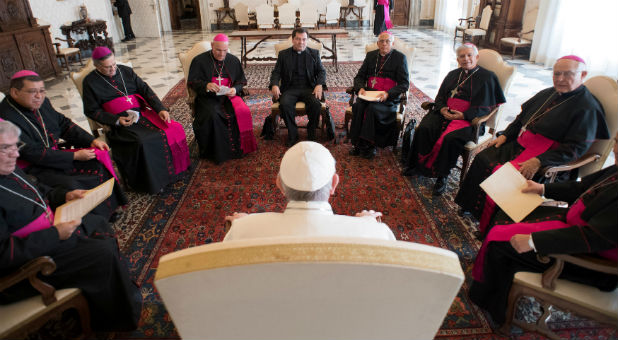3 Steps Pope Francis Could Take to Ignite Revival 500 Years in the Making
Oct. 31, 2017 will mark the 500-year anniversary of Martin Luther nailing his 95 Theses to the Wittenberg church door and igniting the Protestant Reformation. Already, celebrations are underway to commemorate this momentous, world-changing event, which presents both a challenge and an opportunity for Pope Francis and the Catholic Church.
On the one hand, it is an opportunity to participate in these celebrations as a show of love and Christian unity to the world. On the other hand, it is a challenge because the Catholic Church officially labels Luther as a heretic.
In nailing his 95 Theses to the church door, Luther, a Catholic priest and university professor, was challenging his church’s practice of selling indulgences. These indulgences offered forgiveness of sins and freedom from purgatory, all for a price.
From there, Luther went on to challenge papal authority and the sacramental system of the Catholic Church. Called to appear before a tribunal of cardinals, bishops and the Roman emperor, Luther was ordered to recant his teachings or suffer excommunication, which could also mean death.
Luther told this court, meeting in the city of Worms and known as the Diet of Worms, that he was willing to recant, but only if convinced by reason and the Scriptures that he was in error. The Roman hierarchy, however, was not in the habit of “reasoning” with those who challenged their authority, and they demanded that Luther admit his error on the spot.
In his famous reply, which struck a blow for individual freedom and religious liberty, Luther said,
I can believe neither pope nor councils alone, as it is clear that they have erred repeatedly and contradicted themselves. I consider myself convicted by the testimony of Holy Scripture, which is my basis. My conscience is captive to the Word of God; thus I cannot and will not recant anything, because acting against one’s conscience is neither safe nor sound. Here I stand! God help me! Amen!
Luther was excommunicated and had to live as a fugitive in hiding for a time. But out of his bold stand for the gospel emerged the Lutheran Church and then other churches and movements of the Reformation.
The challenge for Pope Francis and the Catholic Church this year is this: How far will they go in embracing Luther? After all, Luther is still a heretic, and Protestant churches are not true churches, according to official Catholic doctrine.
Pope Francis has thus far been positive in statements he has made about Luther and these celebrations. However, if Francis is truly serious about Christian unity, here are three steps he could take that would clearly demonstrate that his commitment to Christian unity is more than mere words.
1. Issue an official statement encouraging Catholics around the world to participate in these celebrations with their Protestant brothers and sisters.
2. Remove Luther’s excommunication and ban as a heretic.
3. Recognize Lutheran and Protestant churches as true churches rather than mere “Christian communities,” and Protestant believers as full and complete Christians rather than “separated brethren.”
Although there have been Catholic/Protestant dialogues involving theologians that have resulted in agreements on issues such as justification by faith, official Catholic policy since Vatican II has not changed: Luther is a heretic and Protestant churches are not true churches.
This 500-year anniversary of the Reformation is a great opportunity that most likely will never exist again. I pray that Pope Francis and the Catholic Church will seize the opportunity and show that they are truly serious about Christian unity.
Dr. Eddie Hyatt is an author, historian and biblical scholar. His books on church history, church order and spiritual awakening are available from Amazon and his website at www.eddiehyatt.com.




























































